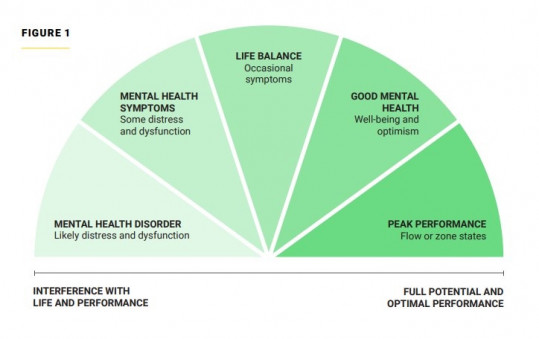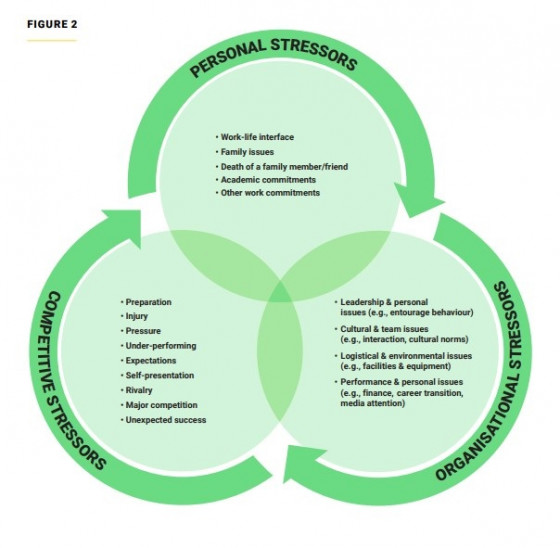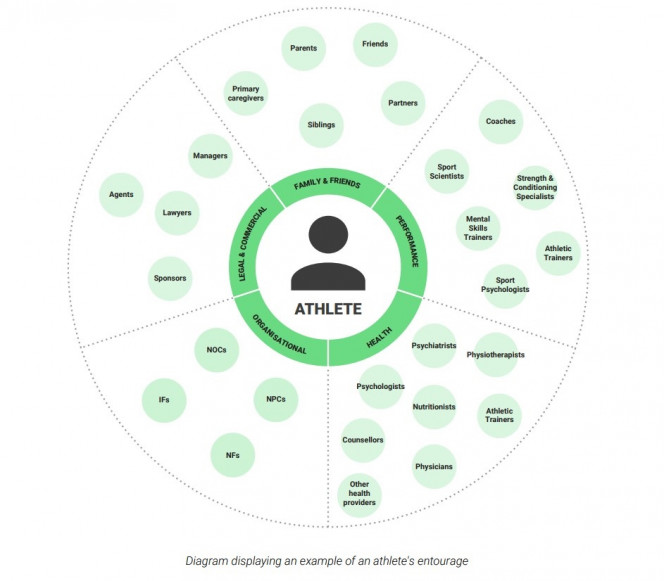Athlete Wellbeing And Support
Athletic performance And Mental Health
The #MentallyFit continuum It is important to recognise that mental health is on a continuum (FIGURE 1).
Athletes who at one point may be mentally healthy may at other times experience mental health symptoms and disorders that are influenced by environmental and other factors. This is the same for athletes as it is for the general population. “Peak performance flows” or “zone states” are often correlated with full athletic potential and athletic performance, but athletic performance and quality of life can be negatively affected by the presence of a mental health disorder.
In sport, mental health is often overlooked. It is important to acknowledge that an athlete’s mental health needs are as important as their physical health needs, and that both contribute to optimising the athlete’s overall well-being in conjunction with performance excellence.
KEY TAKEAWAYS:
• An athlete’s mental health needs are as important as their physical health needs.
• In sporting culture, psychological illness should be accepted as readily as physical injury, and the same process of recovery and return to sport process should apply
Understanding Stressors And Environmental Factors
As for all of us, there are many stressors and environmental factors that can influence athlete mental health. At elite levels, the intensity of competition may lead to increased stress levels. Additionally, athletes may also experience adverse life events outside sport, such as relationship issues, financial trouble, etc. which can exacerbate their stress level.
Both life-event stress and high stress responses can in turn lead to an increased risk of injury. As members of an elite athlete’s entourage are often closest to the athlete on a dayto-day basis, it is important that they are equipped with the knowledge and skill to understand and recognise key stressors and environmental factors which may impact elite athlete mental health.
What are the key stressors?
Key stressors can be split into three categories: competitive stress, organisational stress and personal stress. These three categories are not exclusive and can have knock-on effects or
impacts on other categories.
Competitive stress
• the environmental demands associated primarily
and directly with competitive performance
Personal stress
• the environmental demands associated
primarily and directly with personal
“non‑sporting” life events
Organisational stress
• the environmental demands associated primarily
and directly with the organisation within which
an individual is operating
*The above information is from the IOC Mental Health In Elite Athletes Toolkit
Role Of The Athlete's Entourage
Entourage members should foster psychologically safe athletic environments; described as environments where athletes feel safe in taking interpersonal risks within the sports ecosystem, feel accepted as an integral part of the sports ecosystem, and feel respected by the sports ecosystem.
What is an Athlete’s Entourage?
The entourage consists of all the people associated with an athlete including, but not limited to, managers, agents, coaches, physical trainers, medical staff, scientists, sports organisations, sponsors, lawyers and any person supporting the athlete’s sporting career, including family members and friends.
Key Learning Points For Athlete's Entourage
• The athletes’ entourage plays an enormous role in reducing the stigma around the discussion of mental health. Particular attention should also be paid to deconstructing cultural and gender-based taboos and misconceptions.
• Entourage members should work with athletes to better understand the stressors they face in all aspects of their lives (e.g., competitive stress,
personal stress and organisational stress) in order to help develop healthy coping strategies.
• Mental health should have the same level of significance as physical health. Mental health screenings should be included as a routine part of physical health screenings and be actively encouraged by athletes’ entourage members.
• It is important that entourage members know how to respond to an athlete who is in distress and know how to help them determine the best course of action.
• Entourage members should be knowledgeable of the referral pathways available if they have concerns about an athlete’s mental health. Positive discussions around these pathways can reduce barriers to help seeking.
• It is advised that all entourage members are familiar with the IOC Sport Mental Health Recognition Tool 1 (SMHRT-1),(51) which, although not a diagnostic tool, was developed to assist entourage members in recognising when an athlete may need further help and/or support.
• It is important to be mindful of any strategies, interventions or treatment that athletes may be following to improve their mental health, and to facilitate a safe and supported return to play in the event that an athlete
has been absent from training or competition for physical or mental health reasons.
*The above information is from the IOC Mental Health In Elite Athletes Toolkit
Asking for help
Some of the biggest challenges people face when asking for help are a fear of being judged, feeling embarrassed or not knowing how to ask.
Below are some common barriers people face and ways to overcome them:
Feeling like asking for help is a sign of weakness
Asking for help is the opposite of weakness. In fact it shows courage, an awareness of yourself and a desire to make things better.
Being put off by a bad experience
Sometimes when you ask for help you don’t get the response you were hoping for. It might’ve been bad timing or not quite the right person but don’t let that put you off asking for help again. Be selective and choose someone you trust.
Not knowing what to say
It can be tricky to know how to explain how you’re feeling or get it across the way you want to. There is no right or wrong way but a good tip is to write down a few of your thoughts or worries and use that as a prompt for when you chat.
Helplines
There are many options to call, text, or even DM for instant support and help right now. These teams are available for all New Zealanders feeling down, anxious, overwhelmed or who just need to kōrero with someone.
If you need urgent help now, you can call 111 and let the operator know that you or someone you know is in immediate danger of harming themselves. You can also go to the emergency department at the nearest hospital.
Need To Talk? 1737
A free call and text service for New Zealanders feeling down, anxious, overwhelmed or just need to chat to someone. Call or text 1737.
1737.org.nz
youthline
Free, confidential and non-judgemental youth service.
Free 24/7 text 234
Free 24/7 call 0800 37 66 33
DM on Instagram @youthlinenz
Message on WhatsApp 09 886 5696
youthline.co.nz
Lifeline
Nationwide 24-hour, 7 days a week counselling service. Free to call 0800 54 33 54.
lifeline.org.nz
Anxiety Line
Provides support and help around understanding anxiety and people's experiences. Free call 24/7 on 0800 ANXIETY - 0800 26 94 38
anxiety.org.nz
Depression Helpline
Talk to a trained counsellor who can discuss your situation and find you the right support/tautoko.
Free to call 24/7 on 0800 111 757.
Depression.org.nz
Aunty Dee
Aunty Dee is a free, confidential wellbeing site that can help you work through your problems. Aunty Dee also has useful tips on life, and can connect you to the right support.
auntydee.co.nz
What's Up
Free phone counselling service for young people, 7 days a week. Also reach them online Mon-Sun 11am-10:30pm.
0800 942 8787
whatsup.co.nz
Healthpoint
Healthpoint provides up-to-date information about healthcare providers, referral expectations, services offered and common treatments.
healthpoint.co.nz


































